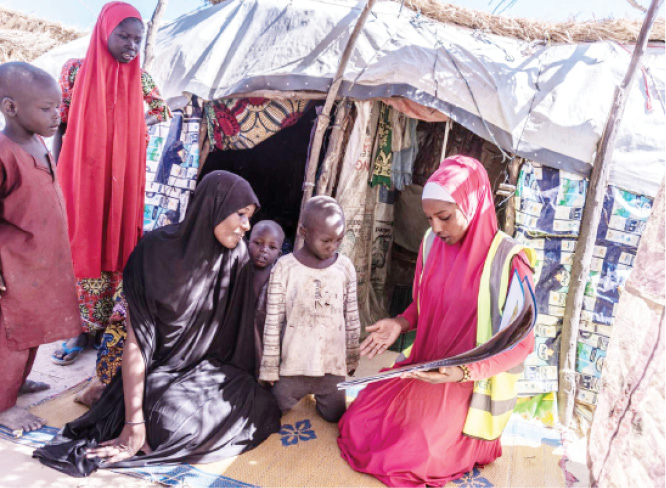Strengthening the roles of women humanitarians
Women humanitarians in Nigeria, and across the world, who have sacrificed their services and acted as first responders in the darkest hours of crises became the focus as the 2019 World Humanitarian Day (WHD) was celebrated this week. The 2019 WHD was set to celebrate women humanitarians and their undying contribution in making the world […]

Community volunteers attend to a family in Borno State
Women humanitarians in Nigeria, and across the world, who have sacrificed their services and acted as first responders in the darkest hours of crises became the focus as the 2019 World Humanitarian Day (WHD) was celebrated this week.
The 2019 WHD was set to celebrate women humanitarians and their undying contribution in making the world a better place because they hold a sense of unparalleled uniqueness, one that adds to the global momentum of female strength, power and perseverance, the United Nations Office for the Coordination of Humanitarian Affairs stated.
This year’s campaign on this class of selfless women supports the recognition that women deserve in the strengthening of global humanitarian response as well as in protection efforts under international law.
Celebrated every 19th August, the WHD 2019, with theme, ‘Women Humanitarians’, aimed to celebrate the unsung women humanitarians that have been working on the frontlines for the survival, well-being and dignity of people affected by crises in their own communities in some of the most difficult regions across the world, and hundreds of those who lost their lives while serving humanity.
The UN Secretary-General, António Guterres, in his statement to mark the day said, from supporting civilians caught up in crisis to addressing disease outbreaks, women humanitarians are on the front lines.
The Executive Director, Women in New Nigeria (WiNN) empowerment initiative, Lucy Yunana, said it is significant celebrating women humanitarians because they have done a lot especially in the North East, especially Borno State.
“When there are crises there is a lot of gender-based violence where women are being used, taken advantage of by men. There are total violations of women in the camps such as, sex for food and currently marriage for card.”
Lucy urged the Federal Government to rebuild the North East of the country, noting that the region lacks development infrastructures such as schools, hospitals and water, among others, adding that they want governments to make a special for subvention to the region, particularly for Borno State.
The chairman, Network of Civil Society Organisations (NECSOB), Borno State, Ahmed Shehu, at a press briefing as part of celebration in honour of Nigerian women humanitarians for their activities, especially in the North East, said “80% of people affected by conflict directly are women and children and most of the time the women are the ones who bear the brunt of the conflict when the husbands are killed, and children are adopted. The women are the ones who cater for the family.”
“Our tradition, culture and mindset usually relegate the women to the background, that is why it is important to amplify the issues to the people on the importance of recognising the women because what they go through to make the society a much better place is worth celebrating.
“Women are resilient; they work, cater for the family needs and provide succour and these deserve to be noticed,” Shehu maintained.
On December 11, 2008, the United Nations General Assembly designated 19 August every year as World Humanitarian Day (WHD). The Day gives special recognition to all humanitarians, UN and other personnel who have worked in the promotion of the humanitarian cause, and commemorates those of them who have lost their lives in the course of duty.
